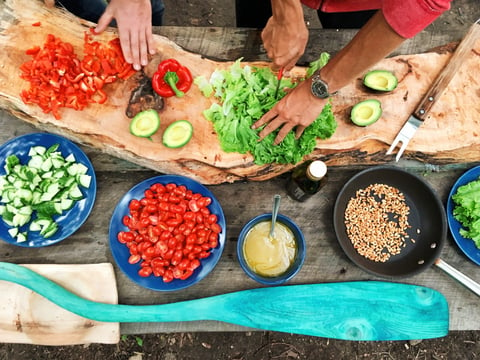
The beauty industry is undergoing a revolution, driven by consumer demand. Rising awareness of how beauty products are made, and what they are made from, is helping clean and cruelty-free beauty brands rise in prominence. Today’s customers are looking for transparent labeling, non-toxic ingredients, organic, and ethical beauty products that are good for their skin and the planet.
Interestingly, the group driving the rise in clean and cruelty-free beauty, according to abillion’s data, are flexitarians. Check out this infographic on sustainable beauty for more details.
Based on our data, here are 5 clean and cruelty-free beauty trends to take note of.
1. Skinimalism is here to stay.
Minimal skincare routines and natural beauty is on the rise. As most of the world stayed home last year, the dependency on makeup reduced while the focus on skincare grew. On abillion, reviews of vegan skincare products outpaced reviews of makeup products, demonstrating that our members were paying more attention to the health of their skin rather than cosmetic appearance.
 Photo by @xuewen of Regenerating Cleanser from Tata Harper.
Photo by @xuewen of Regenerating Cleanser from Tata Harper.
“More is less” is the mantra that several brands, consumers and celebrities believe in. Two brands that are trending (on our platform) and demonstrate this rise in “skinimalism” are Bali Secrets and Tata Harper. Bali Secrets products are made of all-natural and organic ingredients. Their base formula for all of their natural deodorant consists of only 6 ingredients. Similarly, Tata Harper, a luxury skincare brand believes in minimum ingredients, maximum benefits. They embrace farm-to-face beauty that includes natural, organic and ethically sourced ingredients. Herbivore Botanicals started in 2011 in their Seattle kitchen creates products with natural ingredients tested on real people.
2. The convergence of self-care and beauty.
For many, the pandemic has been overwhelming. Over the last year, self-care has become one answer that has helped people cope with daily stress and anxiety. Based on member reviews and sentiment scores, abillion has witnessed a surge in demand for products targeting health and self-care, such as hand & foot care, moisturizers and facial scrubs and masks. This indicates that consumers are looking for a holistic approach to beauty that focuses on personal health and wellness in addition to aesthetics.
Clean beauty brand Pacifica is an American brand whose self-care products have been trending on our platform. One example is their ‘Stress Rehab Coconut and Caffeine Facial Mask’. abillion member hbchic posted this review, “Need to just unwind and feel revitalized, this is a great mask to try out. I know we all may feel fatigued wearing masks for safety, but this mask is something that you are likely to look forward to.”.
3. Refillable beauty: the outside matters just as much as the inside.
The environmental impact of beauty product packaging has become top of mind for many consumers these days. More and more people are asking that not only should beauty products be clean, vegan and sustainable but also that the packaging for these products are similarly environmentally friendly.
 Photo by @meaghants of a Body Cleanser from Lush.
Photo by @meaghants of a Body Cleanser from Lush.
Lush has been a pioneer in efforts to sell beauty products “naked”, i.e. free of any packaging whatsoever. Lush also has a “Bring It Back” returns scheme that allows customers to return their plastic empties to be reused for future products or get a refill.
The Body Shop, one of the world’s most famous ethical beauty companies, recently undertook a 5-year initiative to roll out refillable stations and recycling stations in all of their stores around the world. You can refill haircare, shower gels and handwashes from their range.
Another brand that is 100% recycled packaging, with a minimalistic beauty approach is Priyanka Chopra’s Anomaly. Unveiled in 2021, this hair care brand’s products deviate from the norm with a range of gender-neutral, sustainable shampoos, masks and conditioners, all packed in recyclable containers and affordable pricing.
4. Clean hair products are on the rise.
Vegan hair wellness products are capturing the attention of consumers and businesses alike. Reviews for sustainable hair products on abillion have grown by 50% since the start of the year.
In particular, abillion has seen an interest in specialized hair products such as treatment serums, coloring products, and styling products—in addition to shampoo and conditioners. Reviews for hair products from Unilever’s Love Beauty and Planet have grown considerably since the start of the year. Love Beauty and Planet are available in over a dozen countries. Their most popular products are the Coconut Water & Mimosa Flower shampoo and conditioner.
 Photo by @visalinathan of Coconut Water & Mimosa Flower Shampoo from Love, Beauty & Planet.
Photo by @visalinathan of Coconut Water & Mimosa Flower Shampoo from Love, Beauty & Planet.
This year, Garnier, a century-old skin and hair care company, officially went cruelty-free. Similarly, Mega-beauty retailer Sephora has been working hard to get further into clean beauty over the past few years. In 2018, it launched its own Clean at Sephora label and in 2019, increased the list of ingredients banned from products they carry. Most recently, Sephora started to sell clean hair wellness brand VEGAMOUR’s GRO collection. We only see clean hair care products becoming more mainstream and easier to find.
5. Sustainable sun care.
Sunscreen is a big part of daily beauty rituals. The benefits of sun protection are no secret—we all remember the Baz Luhrmann song. An increasing number of consumers are opting for sustainable, vegan sun care products. Demand for sustainable sun care products has grown 56% since the beginning of the year.
 Photo by @preethiness of Moisturizing Sunscreen from Sun Bum.
Photo by @preethiness of Moisturizing Sunscreen from Sun Bum.




